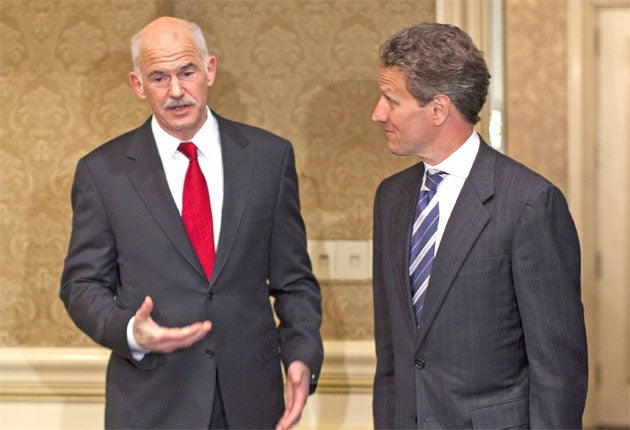Greece pleads with US to stop the speculators
Papandreou calls for new rules in talks at Oval Office on his country's debt crisis

George Papandreou, the Greek Prime Minister, used a visit to the White House yesterday to press President Barack Obama for tighter regulation of the speculative trading blamed for intensifying the country's debt crisis.
Mr Papandreou set out his case at an Oval Office meeting also attended by Timothy Geithner, the Treasury Secretary. It comes amid continuing failure by the White House and Congress to produce new rules to govern the financial instruments that enable banks and hedge funds to bet on a country defaulting.
"It is common sense, enforced by insurance regulators, that a person is not allowed to buy fire insurance on his neighbour's house, and then burn it down to collect on that insurance," Mr Papandreou warned here on Monday, saying that precisely that had happened in the case of Greece.
The solution, he insists, lies in tougher joint measures to clamp down on such activities, especially the credit default swaps that played a big role in aggravating the 2008 financial crisis.
Despite its successful €5bn bond issue last week, Greece still has to refinance €20bn of debt by the end of May. But Mr Papandreou and his Finance Minister, George Papaconstantinou, in Washington on the last leg of tour that previously took them to Berlin, Brussels and Paris, insist that they are not on a begging trip. Speaking at the Brookings Institution thinktank here, Mr Papandreou stressed that any approach to the International Monetary Fund by Greece would only be a last resort, if all else failed. His preference was for Europe itself to deal with problems like those encountered by Athens, and which could yet engulf other eurozone members such as Portugal or Spain, burdened with huge deficits.
"The more there is a European solution to a theoretical but possible problem, the less we will have to talk about an IMF solution," he told The New York Times. He indicated support for a new 'European Monetary Fund', as outlined by Germany's Finance Minister, Wolfgang Schaeuble, at the weekend.
The visit is being seen in Washington as a test of how serious the US and other Western countries are about bringing order and transparency to the largely unregulated derivatives markets.
Although action is all but certain here, it is unclear what form it will take. Ben Bernanke, the Federal Reserve chairman, has again spoken out forcefully about credit default swaps, and the US central bank is investigating deals between the previous Greek government and Goldman Sachs and other Wall Street banks to help Athens to hide the size of its budget deficits.
But Congressional legislation on financial reform has been held up by arguments between the political parties, by intense lobbying by the financial sector, and by the obsessive focus on health care reform. After months of delay, the Senate Finance Committee is expected finally to make public its version of reform. The signs are, however, that this will be weaker than supporters of reform had hoped.
Join our commenting forum
Join thought-provoking conversations, follow other Independent readers and see their replies
Comments
Bookmark popover
Removed from bookmarks